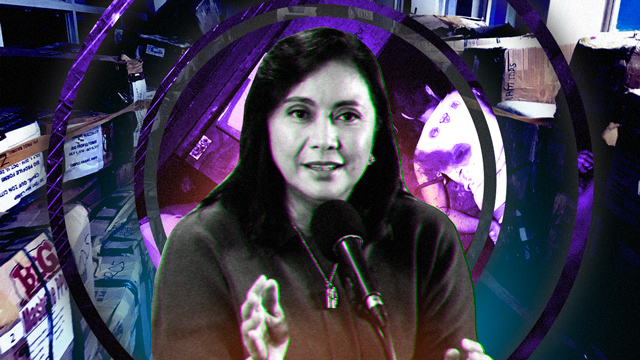SUMMARY
This is AI generated summarization, which may have errors. For context, always refer to the full article.
![[ANALYSIS] The stroke of genius in Robredo’s drug war report](https://www.rappler.com/tachyon/r3-assets/612F469A6EA84F6BAE882D2B94A4B421/img/CB5AE9FF0E724218B38E89B827CF2D35/tl-robredo-drug-war-report.jpg)


Policies ought to be informed by data. But many government officials would rather have us groping in the dark.
Nowhere is this more evident than in President Rodrigo Duterte’s drug war, which started in 2016 and has since killed at least 30,000 people, according to human rights groups.
Even so, there are attempts to put some method in the madness.
Following her 18-day stint as co-chair of the Inter-agency Committee on Anti-illegal Drugs (ICAD), Vice President Leni Robredo finally released her findings on the drug war.
In a nutshell, Robredo’s study brought to light just how little the drug war has quelled the country’s drug problem.
But no sooner had the results been published than Duterte and his minions took turns to attack Robredo and dismiss her report.
They will do well to remember who appointed Robredo to the ICAD in the first place: Duterte himself.
Robredo’s report was also based wholly on government numbers, and therein lies its stroke of genius. She held up a mirror that reflected back to the drug war’s principals and agents their dazzling incompetence.
What’s in the Robredo report anyway, and are the reactions valid?
Damning report
The highlight of Robredo’s 41-page report is a graph comparing the total amount of shabu seized by drug enforcement agencies throughout the drug war and the estimated consumption of shabu in the country (Figure 1).
Since the former is always about 1% of the latter, Robredo claimed the Duterte government has utterly failed to dent drug consumption – the ultimate goal of any sensible drug policy.
This comes as no surprise. Many other countries have given up on drug wars since they’re inherently unwinnable. (READ: War on drugs? Other countries focus on demand, not supply)
Figure 1.
But where did Robredo’s numbers come from? Are they correct?
The short grayish blue bars in Figure 1 are straightforward: they denote seized shabu supplies based on data collected by ICAD.
The tall orange bars, meanwhile, are estimates (not actual data) of shabu consumption in the country. They came from various drug enforcement agencies which told Robredo there are about 3 million shabu users nationwide, each consuming at least one gram of shabu per week for an entire year.
My friend, UP School of Statistics Professor Peter Cayton, spotted a small error in the graph: since the 2019 data on seized shabu supplies ranged from January to October only, the corresponding orange bar should also reflect estimated consumption in those months.
Hence, rather than 156,000 kilos in 2019, it should only be 129,000 kilos (assuming 43 weeks).
But this makes little difference. Robredo’s key point – that the government’s supply interdiction efforts are minuscule compared with the extent of the country’s drug problem – holds.
Groping in the dark
Robredo’s study should still be taken with a grain of salt because of the questionable data supplied to her by various drug enforcement agencies.
For instance, the one-gram-per-week assumption came from the Philippine Drug Enforcement Agency (PDEA), which has yet to validate their own estimate.
Meanwhile, the 3 million figure comes from the Philippine National Police’s Drug Enforcement Group (PNP-DEG).
Duterte himself used to tout “3 to 4 million” drug users, and this has since inexplicably ballooned to “7 to 8 million.” Even the police are baffled: they don’t know where these numbers came from.
If we use Duterte’s bloated figures in the Robredo report, the “success rate” of the drug war will appear even smaller (Figure 2).
Figure 2.
Crappy assumptions beget crappy statistical analysis, and if there’s anyone to blame for Robredo’s study, it’s the various drug enforcement agencies that supplied her the data.
But the true value in Robredo’s report lies in exposing the fact that government, all the while, has been groping in the dark.
Were it not for Robredo’s prodding, relevant drug enforcement agencies would not have been compelled to churn out much-needed numbers, however imperfect. Either these agencies don’t know how to crunch the numbers, or they’re hiding their incompetence and vested interests – or both.
“Government cannot truly say the campaign is working without these baseline numbers,” Robredo said in her report.
For bringing back evidence-based policy-making into the drug war discourse, Robredo deserves all the praise.
Debunking the reactions
Rather than embrace Robredo’s findings open-mindedly, a number of government officials instead rejected them flatly and pettily – often using fallacious arguments. Let’s debunk some here.
The PDEA chief unsurprisingly railed against the study, saying Robredo “dismissed and ignored all of our government’s accomplishments and efforts for the past 3 years” in a “mere political attack.” But Robredo’s report did mention the efforts of various drug enforcement agencies. It so happens they’re insignificant next to the problem in our hands.
The PNP’s officer-in-charge, meanwhile, said that the drug war’s success is proven by a recent survey which showed that 8 in 10 Filipinos are satisfied with the drug war. But just because a policy is popular doesn’t mean it’s correct or appropriate.
The PNP spokesperson also boasted there’s no more local manufacturing of shabu, and they consider that a “100% success rate.” But illegal drugs are still being smuggled into the country – mostly from China.
House Speaker Alan Cayetano agreed with Robredo’s wish for better data, but said it’s “very unfair” to blame government since it’s near impossible these days to get accurate drug consumption data.
But that’s just it: Duterte’s drug war is compromising data collection. Virtually nobody today will admit using drugs to a stranger holding a clipboard.
Some senators also chimed in. Senator Tito Sotto III tweeted, “War vs Drugs fails only when you stop fighting.” Senator Panfilo Lacson minced words by saying, “The war against illegal drugs is a continuing fight and, therefore, I would rather say, it has not been successful enough, rather than call it a failure.” But Duterte’s drug war – like any other war – cannot go on indefinitely, especially if demonstrably futile.
Manila Mayor Isko Moreno said in an interview with ANC he’s uncomfortable with Robredo’s statements, and he found them off-putting especially if you think of the police risking their lives in the frontlines. But this is an appeal to emotion. Just because the study contains uncomfortable data doesn’t make it any less valid.
Finally, Baguio City Mayor Benjamin Magalong, a former police officer, said the drug war’s success can’t be measured by statistics. But what’s the alternative? Hunches? Beliefs? Gut feel?
Piercing the veil
Note that Duterte himself said on multiple occasions that his drug war has failed.
Note, too, that most of the criticisms hurled against Robredo are coming from government agencies that risk having lower budgets if the drug war stops, or from allies who need to stay on Duterte’s good side for their own political survival.
For too long Duterte’s war on drugs has hidden behind a veil of fear, lies, and misconceptions. It’s high time for facts and statistics to pierce that veil. Robredo’s report is a step in that direction. – Rappler.com
The author is a PhD candidate at the UP School of Economics. His views are independent of the views of his affiliations. Follow JC on Twitter (@jcpunongbayan) and Usapang Econ (usapangecon.com).
Add a comment
How does this make you feel?
There are no comments yet. Add your comment to start the conversation.